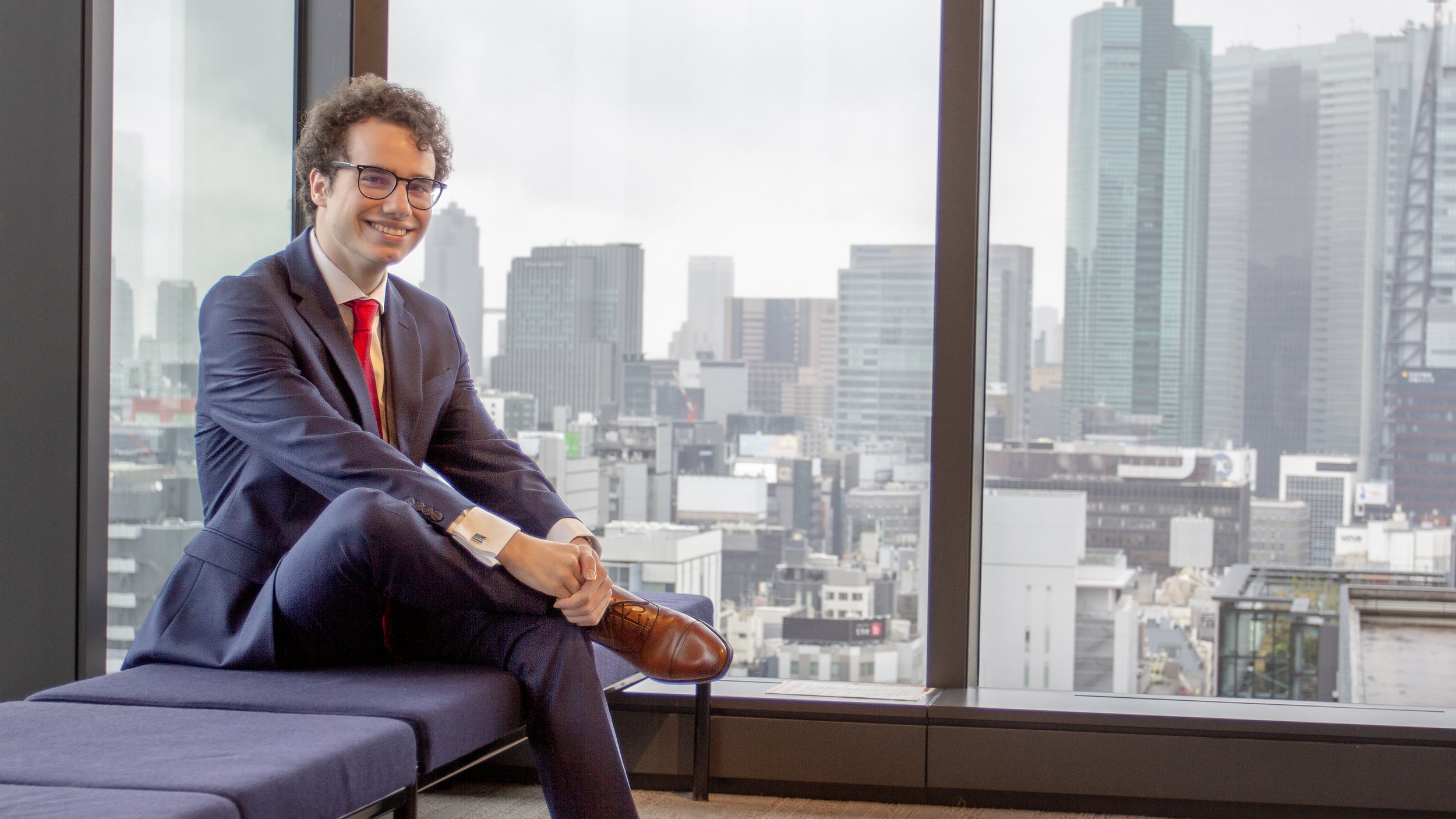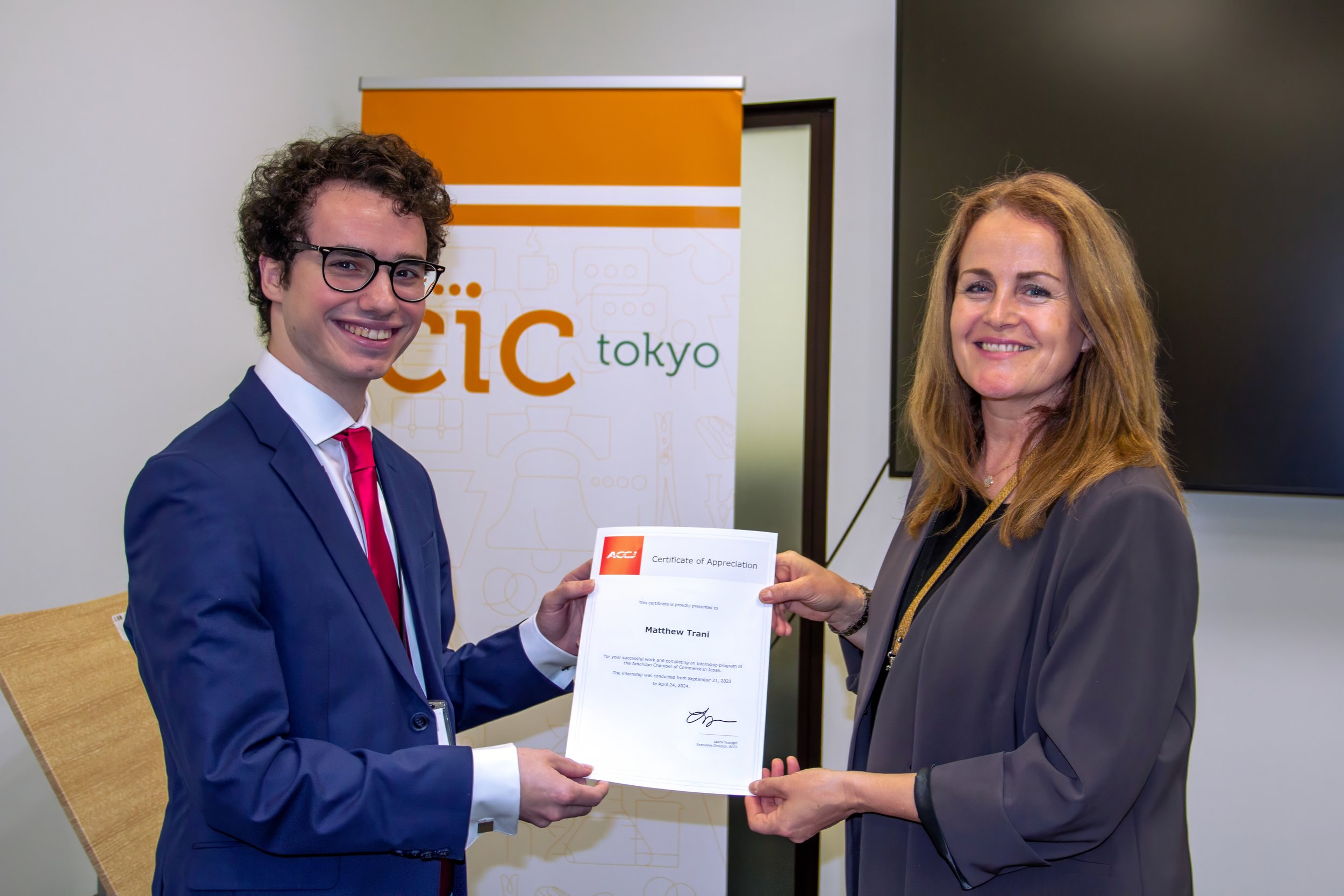A Bishop Scholar’s Journey
As his time as the first Bishop Memorial Scholar draws to a close, we sit down with Matthew Trani to learn about the experience and how he hopes to maintain his ACCJ connections.
As his internship ends, Matthew Trani shares impressions of the ACCJ and a message for future recipients.
Following the tragic deaths of Bill Bishop, his wife Izumi, and their daughter Sophianna on Christmas morning 2022, the American Chamber of Commerce in Japan (ACCJ) and the United States–Japan Bridging Foundation came together to honor their legacy. Launched in July 2023, the Bishop Family Memorial Scholarship Fund brings US students to Temple University, Japan Campus, where Bishop was a lecturer and board member. It also provides an internship at the chamber.
The ACCJ Journal interviewed the first recipient, Matthew Trani, last December, two months into his internship. As his time as a Bishop Memorial Scholar draws to a close, we again sat down with Trani to learn about the experience and how he hopes to maintain his ACCJ connections.
How do you feel about your internship ending?
Odd, because it almost feels like I’m leaving the community that I’ve been attached to—almost to a point of dependency—for the past eight months. There aren’t many places where you can have a working relationship and be able to just casually talk to people in Japan as a foreigner. That feeling hasn’t changed since our first interview.
How will you maintain your ACCJ relationships after you leave?
A lot depends on if I can convince my new company to become a member. If that were to happen, then I would potentially be back within a relatively short time.
But I think I can still connect regardless, as I’ve met as many members outside the chamber as I have through the chamber; they’re all in the same circles. When I get invited to somebody’s house, there will be a professor from Temple there, or someone from Tokyo American Club or the embassy. The network is so tight that they’re never more than one connection away.
Did making connections remain your number one goal?
A little bit. The priority did change from the beginning of the year. Making connections was great, but I needed a job to continue living here. A lot of the companies to which I was thinking of applying are ACCJ members, but I needed to figure things out on my own, which I did. The biggest difficulty is switching from a student visa to a work visa. I was very lucky to find a company that had the patience to do that.
Now, it should be a lot easier to use those connections in the future. So, I would say my goal didn’t change, but now that I’ve achieved my secondary goal, I can go back to my primary goal, which is to continue making and maintaining connections.
Beyond connections, what did you gain most from this experience?
I probably wouldn’t have had the chance to work in a corporate environment where I interacted with so many executives all at once. It’s kind of [remarkable] seeing somebody where it’s like, “Oh, you’re the CEO of Bloomberg Japan, which is the same company my dad works for in New York.” But this is someone that my dad would not usually be able to talk to. And it’s very different having Victor Osumi, as the president of Delta in Japan, saying hi to you and being on a first name basis.
Matthew Trani with ACCJ Executive Director Laura Younger
Where were you most involved at the ACCJ?
That changed over the course of the year. When I started, I was going to a lot of events and getting most of my networking connections early on. Then it shifted to more back-office work, and I worked a lot in Membership and we did some assignments on the competitive advantage of the ACCJ. That project took time to flesh out and get it to how we wanted it for the board.
On the whole, I definitely preferred the administrative work, with the exception of spreadsheets. I think with networking and helping at events it becomes much of the same routine, but when you deal with administrative materials, you can think a lot more critically. I really like jobs in which you can think deeply and try to solve problems.
What was your favorite event?
I learned so much from attending committee meetings. Often, I would think, “I didn’t know that, but that’s very interesting.” Or they would discuss things I’ve noticed in Japan but didn’t have the opportunity to say out loud.
We were at a meeting of the Tourism and Hospitality Committee and they were talking about how Japanese people aren’t going abroad, so domestic airlines are empty. Typically, it’s Japanese people who take those airlines, while foreigners take airlines from their home country.
It’s really crazy that a lot of the time you don’t have the opportunity to voice things like that, but the committees do so and work toward resolving those issues through advocacy papers and other things.
What would you tell future Bishop Scholars?
This is the best opportunity in Japan for a college student, one you never imagined you’d get. That’s what it was for me; I never expected that I would have the opportunity to do this during my time in Japan, and I never planned around it when I originally booked my study abroad. You can’t plan on where you’re going. I would say to all the Bishop Scholars who come after me, I’m sure you probably feel the same, so just roll with it and see where this opportunity takes you.
Trani completed his internship with the ACCJ in late April and is expected to begin working in Japan in mid-June, after having graduated from Hofstra University in late May.


